CCIA is an international, not-for-profit trade association representing a broad cross section of communications and technology firms. For more than 50 years, CCIA has promoted open markets, open systems, and open networks. CCIA members employ more than 1.6 million workers, invest more than $100 billion in research and development, and contribute trillions of dollars in productivity to the global economy.
Locations
United States
25 Massachusetts Avenue NW
Suite 300C
Washington, DC 20001
Phone: +1 (202) 783-0070
General Inquiries
Press Inquiries
Brussels
1st Floor
Rue de la Loi 227
1040 Brussels Belgium
Phone: +32-2-661-2020
EU Press Inquiries
United Kingdom
CCIA’s History
-
1972
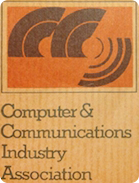
Seven tech company CEOs start what becomes the Computer & Communications Industry Association to advocate for tech and competition policy in Washington DC.
-
1973-74

CCIA gains open records in DOJ’s IBM case and submits a white paper on IBM’s anti-competitive actions with its mainframes. DOJ’s enforcement of the IBM divestiture plan enables the rise of the software industry and Silicon Valley.
-
1975
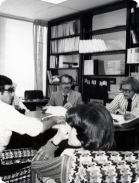
CCIA moves from California to Washington DC to represent its member companies.
-
1978
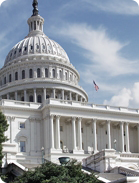
Congress relaxes some ERISA rules, freeing more investment in tech companies and in pension plans and other funds. CCIA lobbied for this change.
-
1981

CCIA and Congressman Jack Kemp work together toward passing the Economic Recovery Tax Act, which enables more venture capital investment.
-
1982
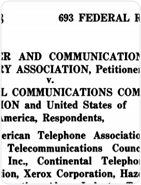
CCIA plays a leading role in the FCC’s Computer II Inquiry, which leads to the agency requiring telecom carriers’ networks to be opened and made available to services like computer networks.
-
1982

Tech industry cheers the breakup of AT&T and welcomes the resulting competitive phone market that leads to fax machines, mobile phones and internet growth.
-
1983
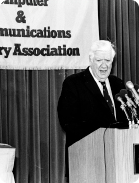
House Speaker Tip O’Neill speaks to members at CCIA’s annual Washington Caucus.
-
1984

After years of advocacy, the Competition in Contracting Act is signed, allowing multi-year contacts and more open, competitive bidding on the contracts, including government tech contracts.
-
1985
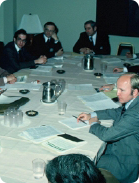
CCIA organizes a meeting of the top 20 tech companies to gain agreement on the Open Standards Initiative.
-
1986-88
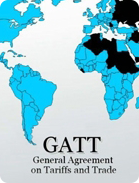
GATT is successfully updated with better IP and services provisions. CCIA continues advocacy on trade with the next goal: sensible export controls.
-
1992
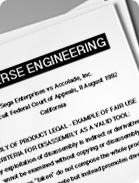
CCIA files an amicus court brief in Sega v. Accolade, which holds that reverse engineering is fair use when it is the only way to achieve interoperability.
-
1994-96
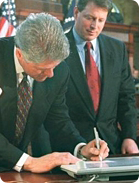
President Clinton signs the 1996 Telecommunications Act. CCIA had lobbied for updates including rules designed to create local network competition.
-
1995
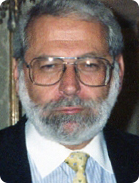
Ed Black becomes president of CCIA.
-
1996
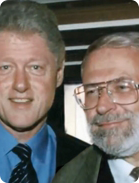
President Clinton signs an executive order on export controls. CCIA successfully advocated for removing software from regulating restrictions.
-
1997
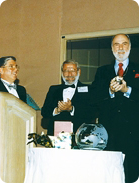
CCIA celebrates its 25th anniversary and presents an award to the internet co-founder Vint Cerf.
-
1998
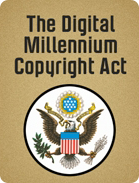
DMCA passes with rules limiting secondary liability for internet and tech companies. CCIA plays a critical role in securing interoperability exemptions for circumvention technology.
-
1999
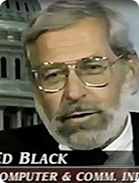
Judge rules Microsoft abused its PC operating system monopoly. CCIA worked with regulators ahead of the ruling.
-
2000

Now Nobel Prize winner Joseph Stiglitz, Peter Orszag and Jonathan Orszag publish their much-quoted, CCIA-commissioned study, “The Role of Government in a Digital Age,” which says there is a growing “need for re-thinking the role of government by policy-makers, the press, the business community, and academics”.
-
2003
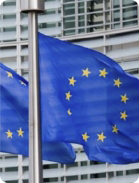
European Parliament approves a directive restricting patentability of software. CCIA was credited with a leading role in defeating the software patent directive in Europe.
-
2007

CCIA publishes its first-ever study on value of copyright exceptions like Fair Use in U.S. economy. CCIA also testifies before the Senate Judiciary Committee on concerns with renewing the Foreign Intelligence Surveillance Act.
-
2009

CCIA opens its Brussels office.
-
2010

CCIA files comments with the FCC on how to structure what becomes its Open Internet Rules in a legally sound way. The FCC ultimately alters its approach and protects net neutrality under Title II.
-
2011

CCIA explains how China’s internet censorship is a trade barrier during testimony at Joint Congressional hearing.
-
2012
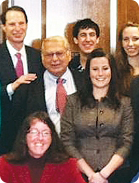
CCIA, which also advocated against similar bills predating SOPA/PIPA, participats in Internet Blackout Day. Senator Wyden thanks CCIA and public interest groups for stopping the bill that would have changed how easily users publish content on the internet.
-
2012

CCIA President & CEO Ed Black testifies before the House Judiciary Crime Subcommittee in support of the GPS Act.
-
2013
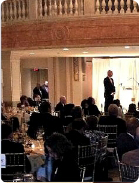
CCIA celebrates its 40th anniversary. ICANN President Fadi Chehade delivers the keynote speech.
-
2013

FTC Chair Edith Ramirez announces a proposal to study patent trolls as a competition issue at a CCIA event at the National Press Club.
-
2015
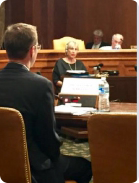
CCIA testifies at a U.S. China Commission hearing on digital trade barriers in China.
-
2015

CCIA testifies on “International Data Flows: Promoting Digital Trade in the 21st Century” before the House Judiciary Committee, explaining the range of digital trade barriers.
-
2016

CCIA Europe becomes the leading tech industry association voice on the EU Digital Single Market proposals as the details are announced.
-
2016-17

CCIA and the Council of Europe co-host panels at the Internet Governance Forums in Mexico (2016) and Switzerland (2017) on reforming law enforcement access to data.
-
2018-19
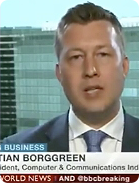
Through meetings, press conferences and filings, CCIA alerts officials to an EU-wide digital tax. It is ultimately rejected.
-
2019

Matt Schruers is promoted to President by CCIA’s board of directors. Earlier in the year Schruers testified before the FTC and House Judiciary Committee on competition and at USTR on digital taxes.